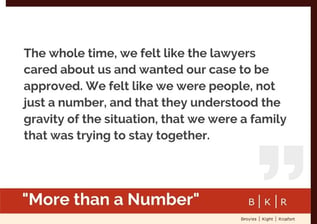Frequently Asked Questions
-
How much do you charge?Our fees differ depending on the case. Because we're committed to making quality immigration help affordable to you, we charge flat fees rather than by the hour. This means you'll always know from the very beginning how much your case will cost.We also offer a number of payment plans in order to make our services affordable to you. Periodically, we offer seasonal deals. Call to find out what deals are being offered now and if a payment plan could apply to your case.
-
Can you help me get a visa to live in another country?Unfortunately, no. We're only qualified to help people who want to live legally in the United States. If you want to visit or move to another country, we recommend you seek legal advice from a competent professional in that country.U.S. passport holders are able to visit many countries for short periods of time without securing a visa. To learn about the requirements of the specific country you would like to visit, see the descriptions on the U.S. Department of State's website: https://travel.state.gov/content/passports/en/country.html.If are a legal permanent resident and would like to obtain a U.S. passport, you will need to naturalize first. See our naturalization page for more information about becoming a citizen.
-
What happens if my work permit is lost or stolen?If your employment authorication card goes missing, you can apply for another one using the same application form you filed before. This means you have to pay USCIS application fees, as well as any legal fees that may apply.If you have a green card application pending with USCIS at the time of your application, you do not have to pay application fees to get a new employment authorization card.If you believe your work permit was stolen, it might be a good idea to report the theft to police, who may be able to help you get it back and can offer you tips on protecting against identity theft.We recommend keeping copies of all your personal identification cards and documents in case the originals ever go missing.
-
I have an approved I-130. Why am I still waiting on my green card?Filing an I-130 petition is only the first step in any family-based immigration petition. When the government approves this form, it recognizes that the relationship through which you can get a green card is valid. However, you still have to apply for the green card (either through adjustment of status or a waiver and consular processing).Some people may not be able to apply for green cards immediately. Others may be able to apply but will wait years or decades before a visa becomes available to them. For more information, see our "Visa Wait Time" page under the "Learn" tab.
-
Why have I never heard of the permanent bar?The permanent bar prevents certain immigrants from receiving immigration benefits even if they are otherwise eligible. (See below for a description of the permanent bar, or visit the "Unlawful Presence Bans" page under the "Learn" tab.)We believe some attorneys don't tell their clients about the permanent bar because they (a) don't know about it or (b) pretend not to be responsible for it. The latter is particularly despicable. We hate to hear stories from clients who've gone to lawyers - or people trying to serve in the capacity of lawyers - who've taken their money, prepared their cases, and then disappear when the clients find out the bad news.At BKR, we'll never take your case if we don't believe we can win it. And we'll tell you the truth - even when it hurts.For tips on how to stay clear of people who would take advantage of you, visit our "Avoid Fraud" page under the "Learn" tab.About the Permanent Bar:Starting April 1, 1997, a law went into effect that punishes people who return to the U.S. after living here illegally. The time you live in the U.S. illegally is called "unlawful presence." The punishment for unlawful presence hits you the second time you try to come back into the country.Many people who have lived in the U.S. illegally have long periods of unlawful presence. They're subject to three- or ten- year bars, meaning they can't receive immigration benefits until after they've lived for three or ten years outside the U.S. (The length of the ban depends on whether they lived in the U.S. illegally for more or less than one year.) Fortunately, these punishments can often be waived so that the person can get a green card without having to serve them.What is more complicated - and more disappointing - is the permanent bar. It applies to people who live illegally in the U.S. for more than a year, leave the country, and then come back again.Except in very rare circumstances (such as if the person becomes the victim of a crime and is eligible for a U-visa), the permanent bar cannot be waived or excused. If you have a permanent bar, you have to live outside the U.S. for ten years before you can even think about asking for an exception. Even then, exceptions are very hard to get.


.png?width=520&name=BKR-Law-Quote-1%20(1).png)

.png?width=400&height=600&name=Victoria%20Headshot%20(1).png)

